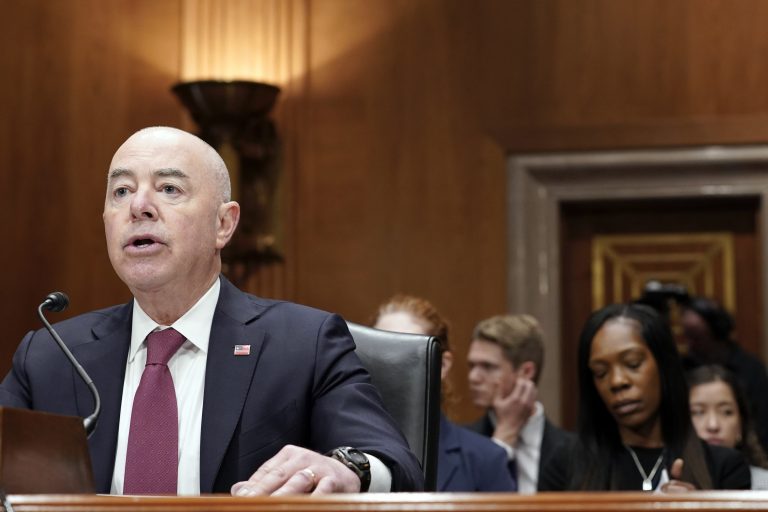House Republicans dug in Wednesday on a two-track strategy to project commitment to border security. Both tracks seem headed toward failure.
On one side, Judiciary Committee Republicans are in the midst of an hourslong debate on a sweeping border and immigration plan they’ll vote to advance Wednesday afternoon after weeks of closed-door negotiations.
Meanwhile, Republicans are also quietly laying the groundwork to potentially impeach Homeland Security Secretary Alejandro Mayorkas as he appears before the Homeland Security panel —ostensibly to talk about his department’s budget request but instead facing a cascade of GOP fury over his handling of the border.
The border bill and Mayorkas impeachment already faced heavy skepticism from a coalition of GOP centrists that’s showing no signs of fading. Centrists have raised fears that the immigration plan goes too far in limiting asylum claims, while also blanching at conservative demands to take the historic step of impeaching a Cabinet official.
Though neither House GOP effort has a chance at success in the Democratic-controlled Senate, a failure to get border security measures through the one chamber of Congress they control would mark a significant stumble for Republicans on an issue highly important to their base.
“I am confident leadership will not bring anything to the floor that does not have the votes to pass. … However long that takes, that’s what you want,” said Rep. Tony Gonzales (R-Texas), a vocal critic of the Judiciary Committee’s bill.
Criticism from purple-district Republicans amounts to a political tee-ball pitch for Democrats, who are all too happy to cite their GOP colleagues in making their case against the immigration legislation.
“This bill has no chance of being enacted into law, and most of its provisions cannot even pass on the House floor because of opposition from Republicans,” said Rep. Jerry Nadler (D-N.Y.), his party’s top member on the Judiciary panel.
In a nod toward Gonzales, Nadler added that Republicans “should heed the advice of one of their own.”
While the intra-GOP fight has blasted to the forefront, given the Judiciary Committee’s advancement of the border security bill Wednesday, Gonzales remains locked in a monthslong public spat with Rep. Chip Roy (R-Texas), who has vocally pushed more conservative immigration measures.
Though Roy’s bill isn’t in the Judiciary package, pieces of the committee’s proposed changes to asylum laws closely reflect sections of the Texas Republican’s plan.
Many Republicans defended the Judiciary Committee bill, arguing it was needed to push back against more than two years of Biden administration policies and, Rep. Tom McClintock (R-Calif.) added, “to restore the successful Trump policy.” Republicans argue the border influx was much more manageable under the former president, when the Trump administration placed drastic limits on migrants’ ability to claim asylum.
Meanwhile, Democrats aren’t making it easy for Republicans to pass the legislation, offering a slew of potential changes that could appeal to skeptical centrists.
The first Democratic amendment would have stripped out so-called e-verify requirements, which require that certain businesses check the citizenship status of their employees — a bid to turn agriculture-minded Republicans like Reps. Dan Newhouse (R-Wash.) and Don Bacon (R-Neb.) against the broader bill.
That failed in the Judiciary Committee along party lines. A second amendment from Rep. Zoe Lofgren (D-Calif.) that would have delayed the implementation of the e-verify mandate also failed.
“I’m surprised that this bill is in here, frankly. … It’s never been able to pass on the House floor,” Progressive Caucus Chair Pramila Jayapal (D-Wash.) said.
The immigration package is likely to clear the Judiciary Committee on Wednesday without getting tangled in GOP infighting, in part because the panel is stocked with conservatives. But what can clear that panel, Republicans acknowledge, isn’t automatically reflective of what could get 218 votes on the House floor.
And Republicans have set an ambitious goal to clear legislation through the chamber by the middle of next month.
In the meantime, the House Homeland Security Committee will hold a vote on its own border bill next week. The Rules Committee is then expected to merge the two proposals, allowing Republicans to make more changes before a final product gets to the floor.
The Homeland Security panel had initially been expected to hold a vote on its proposal this week, but that was delayed by Mayorkas’ scheduled testimony. And Rep. Mark Green (R-Tenn.), the panel’s chair, reportedly told donors this month that he believed his committee was making the case for Mayorkas’ impeachment — a move that would require near-total House GOP unity to succeed.
Republicans have so far rolled out two impeachment resolutions against Mayorkas, and neither has won over even close to a majority of the House GOP conference.
One, from Rep. Pat Fallon (R-Texas), currently has 42 cosponsors, while a separate resolution from Rep. Andy Biggs (R-Ariz.) has 32. Democrats, and some GOP lawmakers, have warned that their colleagues are equating a policy disagreement — namely, that Mayorkas isn’t appropriately handling increased migration levels — to a high crime or misdemeanor.
“I was dismayed to see that, speaking to a group of campaign contributors last week about today’s hearing, the chairman said, and I quote, ‘Get the popcorn, it’s going to be fun.’ I think that tells Americans all they need to know,” said Mississippi Rep. Bennie Thompson, the top Democrat on the Homeland Security Committee.
During Wednesday’s hearing, Green zeroed in on the GOP’s argument for impeachment, telling Mayorkas that “you have not secured our borders, and I believe you’ve done so intentionally.”



